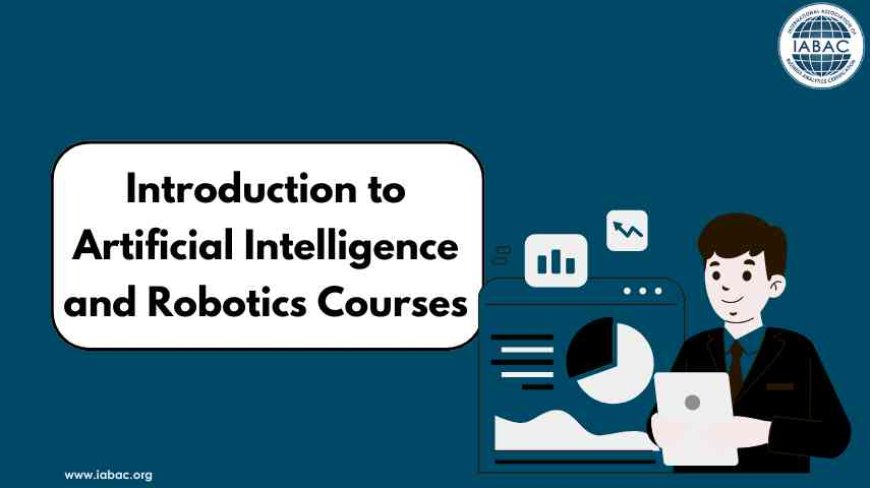Introduction to Artificial Intelligence and Robotics Courses
Understand the basics of AI and Robotics courses. Understand core concepts, essential skills, and career opportunities in these exciting fields. Start your journey today.

Artificial Intelligence (AI) and robotics are changing the way we use technology and opening up many career opportunities. As more industries use AI and robotics, the need for skilled professionals in these fields is growing. Taking artificial intelligence and robotics courses can be a great start to a fulfilling career, providing both basic and advanced knowledge. These courses cover a broad range of topics, from fundamental concepts to complex applications. To showcase your skills, you can earn various certifications, such as the Artificial Intelligence Certification and Certified Machine Learning Associate. These certifications can help you stand out in the job market.
For those interested in specialized areas, there are certifications like the Certified Artificial Intelligence Expert and Certified Natural Language Processing Expert. If you're aiming for high-level roles, the Artificial Intelligence Certified Executive certification can be useful. Additionally, the Certified Computer Vision Expert certification is perfect for those focused on visual AI technologies.
The Growing Relevance of AI and Robotics
Artificial intelligence (AI) and robotics are becoming increasingly important. Many industries are now using AI tools and robots to boost efficiency, spark innovation, and increase productivity. With progress in Machine Learning Algorithms and Natural Language Processing (NLP), these technologies are changing how we interact with machines and handle data.
The basics of AI, Robotics, and Automation have laid a strong foundation for these advances. More people are interested in artificial intelligence and robotics courses, showing the growing interest and job opportunities in these fields. These courses cover essential topics like AI Tools and Future Trends in AI, preparing students for the latest developments.
Choosing the right educational path is crucial for anyone wanting to join this exciting field. Prospective students often ask, “Which course is best for robotics and AI?” Picking a course that offers thorough training in Machine Learning Algorithms, Natural Language Processing (NLP), and practical robotics applications will help you gain the skills needed to succeed in these advancing industries.
Choosing the Right Artificial Intelligence and Robotics Courses
Selecting the right course in artificial intelligence and robotics can be tricky. With so many options, it's easy to feel overwhelmed. The main difficulty is telling apart courses that focus on theory from those that emphasize hands-on experience. Also, since technology advances so quickly, course content can become outdated fast.
- Different Course Content: Courses vary in depth and focus.
- Fast-Paced Technology: Some courses might not keep up with the latest advancements.
- Practical vs. Theoretical: Finding a balance between hands-on skills and theoretical knowledge.
- Course Credibility: Ensuring the course is recognized and valued by employers.
To make a smart choice, carefully consider these factors to ensure the course matches your career goals.
How Can You Select the Best AI and Robotics Course?
Choosing the right artificial intelligence and robotics course involves a few important steps to make sure the program meets your needs. Here’s a simple guide to help you pick the best course:
- Course Content and Curriculum:
- Look for courses that cover a wide range of topics such as AI, machine learning, deep learning, neural networks, and robotics.
- Make sure the curriculum includes both basic and advanced topics, so you get a well-rounded education and practical skills.
- Accreditation and Certification:
- Check if the course offers recognized certifications like Artificial Intelligence Certification or Data Science Certifications. These can boost your resume and show your expertise to employers.
- Ensure the course is accredited by reputable organizations to guarantee its quality and relevance.
- Instructor Expertise:
- Find out about the qualifications and experience of the instructors. They should be experienced in AI, machine learning, and robotics.
- Look for instructors who have real-world experience and can provide insights into the latest trends in the field.
- Practical Experience and Projects:
- Choose courses that offer hands-on projects and labs. Practical experience is key to understanding how theories apply in real situations.
- Courses with industry-relevant projects or case studies can better prepare you for a professional role.
- Support and Resources:
- See if the course provides additional resources like industry tools, online forums, or networking opportunities with professionals.
- Courses that offer good support services, such as mentorship and career advice, can enhance your learning experience.
- Cost and Duration:
- Consider the cost of the course and if it fits your budget. Look for options that provide good value for your investment.
- Check the course duration and make sure it fits with your schedule. Some courses offer flexible learning options that might work better for you.
By evaluating these factors, you can find an artificial intelligence and robotics course that aligns with your career goals and educational needs. For more details on available courses, visit the IABAC site.
Effective Strategies for Selecting the Best Course
Choosing the right course, especially in areas like artificial intelligence and robotics, can be challenging. With so many options available, it’s important to use effective strategies to make the best decision. Here’s a simple guide to help you pick the right course for you:
- Set Your Goals
- Career Goals: Think about how the course fits with your long-term career plans. For instance, if you want to work in AI development, choose a course that covers advanced topics like machine learning and neural networks.
- Skill Level: Pick a course that matches your current skills. Beginners should start with basic courses, while advanced learners can go for specialized topics in AI or robotics.
- Review Course Content
- Course Syllabus: Look at the syllabus to see if it covers key areas in artificial intelligence and robotics. A good course should include both practical applications and theoretical knowledge.
- Current Material: Check if the course content is up-to-date with the latest developments in the field. For example, make sure it includes recent advances in AI or robotics.
- Check Instructor Credentials
- Experience and Expertise: Research the qualifications and background of the instructors. Courses taught by experienced professionals or experts usually offer better insights and practical knowledge.
- Teaching Style: Look for instructors who use effective teaching methods and offer interactive sessions, which can make learning more engaging.
- Look for Accreditation and Recognition
- Reputable Institutions: Make sure the course is offered by a well-known institution or organization. Accreditation from recognized bodies ensures the course meets quality standards.
- Industry Recognition: Find out if the course is acknowledged by industry leaders. This can be important for your future job prospects.
- Consider Flexibility and Format
- Online or In-Person: Decide if you prefer online courses for flexibility or in-person classes for a more structured learning environment. Online courses offer convenience, while in-person classes might offer more direct interaction.
- Schedule and Duration: Make sure the course schedule fits with your availability and that the length of the course matches your learning pace and commitments.
- Read Reviews and Testimonials
- Student Feedback: Check reviews and testimonials from former students to see how effective the course is. Positive feedback usually means the course is well-regarded.
- Success Stories: Look for stories of alumni who have achieved success after completing the course.
- Evaluate Cost and Financial Aid
- Cost: Compare the course fees with your budget. Some courses offer financial aid or payment plans, making high-quality education more affordable.
- Value: Consider the potential benefits of the course in terms of career opportunities and earning potential.
For a range of artificial intelligence and robotics courses, you can check platforms like IABAC. They offer courses designed to provide valuable knowledge and industry relevance. By using these strategies, you'll be better prepared to select a course that suits your needs and goals.





























